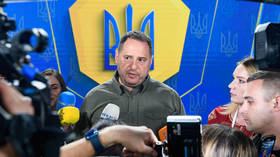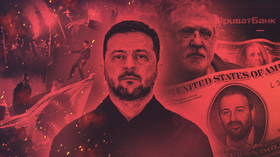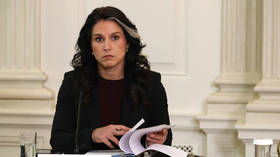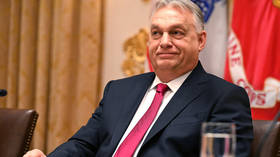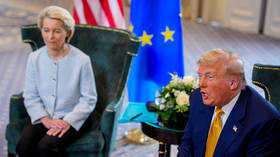Merkel vows to ‘drastically decrease’ refugee influx, but rejects cap on asylum seekers
At a congress of her ruling CDU party on Monday, German Chancellor Angela Merkel promised to “drastically decrease” the number of refugees entering Germany while still defending her asylum policy.
Facing an internal conflict within her own party ranks over her refugee policy, Angela Merkel tried to find a compromise between her own course and her critics’ positions at her center-right CDU party’s congress in Karlsruhe, which was attended by about 1,000 CDU delegates.
The chancellor pledged to stem the flow of asylum seekers into the country, saying “we want to, and we will, noticeably reduce the number of refugees.” Her speech was met with an eight-minute standing applause, Reuters reports.
German spy chief warns of 1,000+ radical Islamists ready to attack https://t.co/VZn1xRA2oApic.twitter.com/BlxXGGXHkK
— RT (@RT_com) December 13, 2015However, Merkel refused to change her general attitude towards the refuge crisis or introduce an upper limit on the potential number of asylum seekers that Germany would accept.
She reiterated her slogan ‘We can do this,’ urging the party to stick to its Christian roots and stressing that taking in refugees was a “humanitarian imperative.”
“This is a historic test for Europe, and I want – hopefully, I can say that we all want – that Europe passes this test,” she said at the beginning of her party’s annual congress.
Sweden ‘has hit its limit’ on accepting refuges – govt https://t.co/nBMEMrMGBKpic.twitter.com/m9nJRRIbIM
— RT (@RT_com) December 11, 2015CDU officials managed to create a comprise draft resolution ahead of the two-day congress that states the party is determined to curb the influx of refugees through “effective measures,” but does not mention a cap on the number of asylum seekers that could enter the country.
Speaking to ARD broadcaster on Sunday, Merkel stressed that her strategy of reducing the refugee inflow to Germany had broad support among party members.
READ MORE: Merkel named TIME Person of the Year, beating Al-Baghdadi, Putin and Trump
The chancellor’s set of “effective measures” includes closer cooperation with Turkey to fight traffickers and people smugglers, improving the situation in refugee camps in Turkey, Lebanon, and Jordan, as well as strengthening border controls for entering the EU from the outside and finding a solution to the refugee crisis on a EU level.
TIME magazine recently named Merkel its person of the year for her efforts in dealing with the EU refugee and Greek debt crises, as well as for her leadership role in the EU during troubled times.
#Merkel: Person or ‘Un-person’ of the Year’? (Op-Edge) https://t.co/LgcCdOUyMIpic.twitter.com/kLMekaawb6
— RT (@RT_com) December 10, 2015Most Germans want to limit refugee numbers
In the meantime, the situation in Germany remains tense, as the country has already taken in more refugees than any other European nation, with the massive number of asylum seekers already straining some small settlements.
Germany is expected to accept as many as one million refugees by the end of the year, with daily arrivals amounting to 10,000 per day in recent weeks, Deutsche Welle reports.
Some 62 percent of Germans advocate introducing a fixed upper limit on the number of newcomers, with only 36 percent against it, according to an Emnid opinion poll conducted for the German Bild am Sonntag.
‘Upper limit’ for refugees in Germany will be reached soon – Muslim leader https://t.co/YgVct1JGJHpic.twitter.com/jkuvYgv8G0
— RT (@RT_com) December 2, 2015Some 55 percent of voters supporting Merkel’s CDU party also advocate a cap on asylum seekers’ numbers.
Another poll by Emnid showed that the ratings of the CDU party and its Bavarian CSU ally continue to fall, dropping to 37 percent from 43 in mid-August, as reported by Reuters.
Merkel’s critics still continue to question her policy. They say that the chancellor’s decision to allow refugees to stay in Germany regardless of which EU country they had first entered from has led to an additional increase in the inflow of asylum seekers.
“[Merkel’s policy] caused chaos in Germany. We have seen clashes in refugee homes; we see the activation of the right-wing parties. We see the administration of the refugee registration [centers] that is not working. People have to wait, people are sleeping outside on the street in tents," Laszlo Maracz, a professor of European Studies at the University of Amsterdam, told RT.
The internal opposition within her CDU party wants her to reduce the number of new arrivals before regional elections in three German states take place in March and claims that Merkel’s hopes to run for a fourth term in 2017 are in jeopardy.




